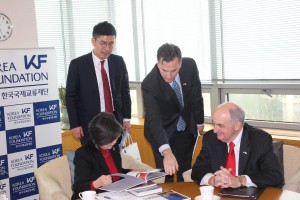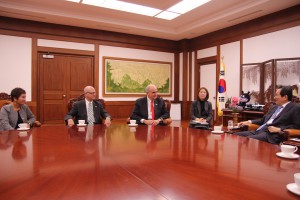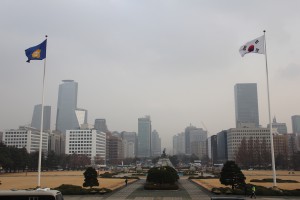A commitment to intercultural and international understanding
It’s truly a fascinating time to be in Seoul right now. As Americans back home continue to navigate the wake of a long and contentious election, South Koreans are dealing with their own political uncertainty, with the nation’s embattled president, Park Geun-hye, facing an impeachment vote that could come as early as Friday. Indeed, Seoul has been swallowed up by six straight weeks of massive protests, the largest ongoing series of demonstrations in South Korea since the movement to democratize the country nearly 30 years ago.
Putting aside partisan politics at home and the specific issues here concerning the controversies involving the country’s troubled leadership, one would be hard-pressed to find a more compelling backdrop for the IU delegation’s return trip to South Korea. That’s especially true of today’s meetings with top education and government officials, each of which centered on the critical importance of educational exchanges that enable greater understanding of other peoples, political forces and cultures in today’s increasingly interconnected world.
A ‘Midwestern hub’ for Korean studies
For a quarter century now, the Korea Foundation — headquartered in Seoul and the first stop in a series of IU delegation meetings today — has made it its mission to foster cultural exchange that broadens understanding of Korea within the international community. The foundation also seeks to increase friendship and goodwill between Korea and the rest of the world. To accomplish these goals, the foundation has organized and supported various activities inside and outside Korea aimed at fostering international exchange and research.
In recent years, Korean society has experienced rapid modernization on an unprecedented scale, with dramatic transformations in its political, economic and cultural sectors. Today, the country’s economy is the fourth largest in Asia and the 11th largest in the world. It is also among the world’s most technologically advanced and digitally connected countries, as well as one of our nation’s most important strategic and economic partners.
At IU — a university with great strengths in Korean language instruction going back a half century, more than 70 foreign languages taught and acclaimed area studies programs — The Korea Foundation has found a willing, energetic and extremely able partner.

IU President Michael A. McRobbie, far right, with Keum-jin Yoon, executive vice president of The Korea Foundation, seated left. Second from right is IU School of Global and International Studies Dean Lee Feinstein.
In 2012, major support from the foundation helped make possible — along with donations from successful IU alumni Young-jin Kim, William Joo and a third anonymous donor — IU’s first endowed chair in Korean studies and first such position to be established at IU’s School of Global and International Studies, now held by Seung-kyung Kim, a professor in the Department of East Asian Languages and Cultures.
Earlier this fall, the foundation enabled the launch of IU’s new Institute for Korean Studies, one of the only such academic institutes of its kind in the U.S., which educates students on various aspects of contemporary Korea. The launch was preceded by a conference that delivered many of the nation’s most distinguished Korea scholars to IU’s Bloomington campus to discuss the establishment of Korean studies in the United States. The conference, “Peace Corps Volunteers: The Making of Korean Studies in the United States,” served as an important early success for the fledgling institute and added another chapter to IU’s storied history of engagement with Korea and, more broadly, East Asia.
This morning’s meeting at the foundation’s headquarters offered an opportunity for IU President Michael A. McRobbie, IU Vice President for International Affairs David Zaret and Lee A. Feinstein, founding dean of the IU School of Global and International Studies and former U.S. ambassador to Poland, to thank The Korea Foundation, represented by Executive Vice President Keum-jin Yoon, for the founding chair position and its general commitment to IU’s new Institute for Korean Studies. As Feinstein reported, “the vote of confidence” The Korea Foundation has made in IU has rapidly accelerated the university’s strategic effort to become a Midwestern U.S. hub for advanced study of contemporary Korea — study that, up until now, has been mostly relegated to America’s East and West coasts.
Led by McRobbie, who is making his sixth visit to Korea as IU president, the IU contingent also was given the opportunity to explore the foundation’s future plans for the promotion of Korean studies in the U.S. and potential additional support for new faculty that will ensure IU’s new institute continue the progress it has made in deepening understanding and appreciation of this dynamic part of the world.
See video of the inauguration ceremony for the institute:
Giving more thanks
From the foundation, IU delegation members traveled to the Academy of Korean Studies, a Seoul-based research and educational institute dedicated to interpreting and analyzing traditional Korean culture, revitalizing the field of Korean studies and educating scholars. While there, McRobbie thanked academy President Ki-dong Lee for the academy’s support for the inaugural “Peace Corps Volunteers” conference at IU’s Institute for Korean Studies.
Members of the delegation also expressed IU’s appreciation to the academy for providing a five-year Core University Program grant totaling nearly $1 million over a five-year period that will allow IU to pursue a project designed to deliver Korean studies across the larger Midwest. As part of the project, IU’s new institute will work with faculty at the University of Illinois, Urbana-Champaign; the University of Kentucky; the University of Louisville; and Purdue University, to sponsor cultural and academic programming related to Korea at these institutions.
The IU delegation ended a busy and productive day with a trip to the National Assembly Building, which houses South Korea’s 300-member national legislature. The building, located on Yeouido Island in Seoul, is the largest national assembly building in Asia. With its large blue dome, it is one of the first notable landmarks visitors to Seoul see upon arriving in the city from Inchon Airport. There they met with National Assembly Speaker Chung Sye-kyun, who presides over the governing body, and they were joined by Su-chan Chae, professor at the Korea Advanced Institute of Science and Technology and chairman of the board of the Han River Society.

Members of IU’s delegation discussed education and politics with National Assembly Speaker Chung Sye-kyun, far right.
During a nearly hourlong sit-down meeting, President McRobbie, Speaker Chung and former Ambassador Feinstein engaged in a warm and friendly discussion about recent political events in both the U.S. and Korea, the tradition of friendship between the two nations, IU’s emphasis on engaging with regions of economic, political and cultural importance in the world, including East Asia, and the power of educational exchange to bring people of the world closer together.
The meeting provided a perfect wrap-up to an energizing and eventful (albeit too short!) several days here in Seoul, that saw IU reunite with old friends, re-engage existing partners who strongly support IU’s international mission and build new connections with Korea that promise to result in even greater engagement here in the years to come.
Next stop: Beijing!
Tags: Academy of Korean Studies, Chung Sye-kyun, David Zaret, Institute for Korean Studies, IU School of Global and International Studies, Keum-jin Yoon, Ki-dong Lee, Korea Foundation, Lee Feinstein, Michael A. McRobbie, National Assembly, Park Geun-hye, Seoul, Seung-kyung Kim, South Korea, Sun-chan Chae, William Joo, Young-jin Kim



